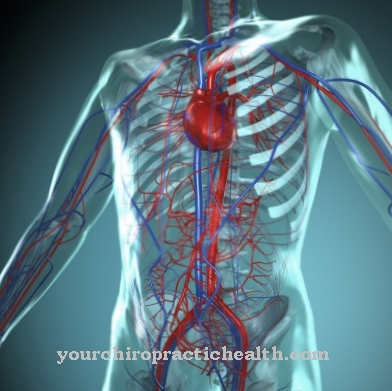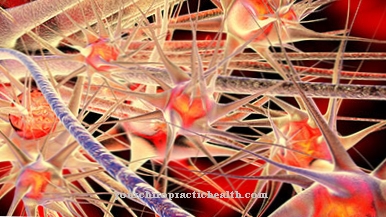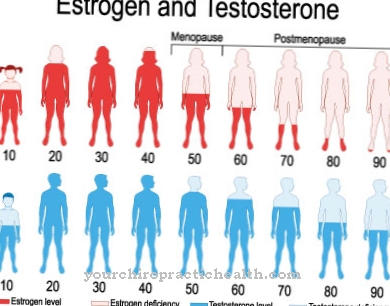The Nerve inflammation or neuritis A few years ago, this was a long path of suffering for the patients because the majority of those affected had no visible physical impairments. It was only with the development of modern medical devices that nerve inflammation could also be clearly diagnosed.
What is Nerve Inflammation?

Nerve inflammation, which is also known as neuritis in medical jargon, sometimes specifically affects individual regions of the body such as the extremities, the head or the trunk or can affect the entire body.
The inflammation of the nerves is particularly agonizing when it has manifested itself on the face. With nerve inflammation, inflammatory processes occur on the peripheral nerves or on what is known as a cranial nerve. In addition, the term nerve inflammation also applies to the destruction of organs or nerves, symptoms of poisoning and pathological changes caused by an accident.
Depending on the number of nerves involved in a nerve inflammation, a distinction is made between polyneuropathy (poly = many) and polyneuritis.
causes
Nerve inflammation can be triggered and promoted by different causes. The main reasons that contribute to nerve inflammation are damage to the vegetative and peripheral nerves.
These functional disorders or irritations are caused by toxins from the environment as well as toxins from the body's metabolism and addictive substances. In addition, nerve inflammation is a typical side effect of multiple sclerosis. In addition, an insufficient supply of minerals and vitamins to the organism leads to nerve inflammation. Injuries to the nerves or the interruption of their normal anatomical course, deep wounds or the after-effects of costly operations can also lead to nerve inflammation.
If mechanical pressure is permanently and permanently exerted on certain nerve areas due to incorrect posture or excessive strain, this overstimulation of the nerves can show up as local nerve inflammation. Various viruses and psychological overstrain can also trigger nerve inflammation.
You can find your medication here
➔ Medicines for paresthesia and circulatory disordersSymptoms, ailments & signs
Nerve inflammation can cause different symptoms depending on the extent. These range from slight paresthesia to severe functional disorders in important areas of the body. A tingling sensation in certain parts of the body is a typical symptom of possible nerve inflammation. In a more pronounced form, those affected often give the comparison with an ants tingling sensation.
An emotional disorder such as an unnatural feeling of warmth or cold also counts. Another sign of nerve inflammation can be numbness. Inexplicable feelings of anxiety or pressure can also occur. In many cases, an electrifying feeling is circumscribed. Muscle twitching, which can be clearly noticeable, can also be a sign of nerve inflammation.
The condition can also manifest itself through effects on fine motor skills such as frequent dropping of objects. Symptoms that indicate inflammation of the nerves include poor circulation and excessive sweating. As a rule, pain occurs, which can also be more severe. Uncomfortable feelings such as stinging, tearing, and burning can affect the person affected.
Dizziness and muscle weakness are also possible symptoms of nerve inflammation. Muscle weakness can be an indication of impending paralysis. In severe cases, functional disorders of body organs can also occur and cause vegetative deficits. Restrictions of movement and general hypersensitivity are also among the symptoms that occur in the case of nerve inflammation.
Course of disease
Nerve inflammation always proceeds differently depending on the nerve regions affected. Nevertheless, the courses are always characterized by pain, which leads to a massive restriction in mobility and well-being.
The first signs that can announce a nerve inflammation are local abnormal sensations, which can also occur on several nerves at the same time. Those affected often suffer from a tingling sensation when the nerve is inflamed, the nerves twitch and the nerve areas become numb.
Often the body parts involved are also cool. Depending on the type of inflamed nerve, paralysis, as it were, occurs in addition to abnormal sensations and disorders of sensitivity. In this context, the symptoms of paralysis are not always to be expected in the case of nerve inflammation, but they are classic for polyneuropathy or multiple sclerosis.
Complications
Nerve inflammation or neuritis can lead to a variety of complications. They usually affect those parts of the body that are supplied by the inflamed nerve. A frequently occurring consequence of nerve inflammation is the insufficient supply of organs.
This in turn causes functional impairments or even failure of the affected organs. If nerves that supply the skin are affected, sensitivity disorders often appear in the diseased areas. Furthermore, it can lead to paresthesia or tingling on the skin.
It is not uncommon for the neuritis to spread to other parts of the body. In extreme cases, the damage to the nerves can no longer be reversed. Likewise, the death of the nerve is possible. In the case of tooth inflammation, we speak of a “dead tooth” that requires root canal treatment. In the worst case, the inflamed tooth will be lost.
Inflammation of the nerves can also affect the behavior of those affected. So the sick can behave as sad as they are aggressive. Often social relationships are negatively affected by this. A serious complication is the appearance of very pronounced pain throughout the body.
Furthermore, there is a risk of circulatory disorders, which sometimes even lead to life-threatening conditions. Strokes and heart attacks are among the most serious sequelae of neuritis. Furthermore, symptoms of paralysis are possible due to nerve inflammation. Without proper medical treatment, there is a risk of permanent paralysis.
When should you go to the doctor?
A doctor's visit is advisable if the person concerned suffers from physical impairments. A doctor should always be consulted if the symptoms appear suddenly, persist or increase.
A doctor should be consulted in the event of physical complaints such as sensory disorders on the skin, numbness or hypersensitivity. A doctor is required if there is pain, mobility problems or restricted mobility.
Nerve inflammation triggers an insufficient supply of the organs or other areas of the organism. The general functionality or thought processes are limited. A doctor should be consulted as soon as individual systems malfunction. Concentration and attention deficits, a decrease in physical and emotional resilience, overreactions and disorders of the sensory organs must be clarified. An internal restlessness, irritability or the inability to complete everyday duties should be presented to a doctor. Without medical care, the level of suffering increases and well-being drops drastically. If the inflammation continues to spread throughout the body, a doctor is needed.
Doctors & therapists in your area
Treatment & Therapy
From a conventional medical point of view, primary therapy is used for nerve inflammation. This is chosen depending on the causal relationships. In addition to special drugs such as antibiotics and anti-inflammatory drugs, painkillers are also used. If the patient's condition does not improve, the drug measures for the inflammation of the nerves are combined with a so-called pain therapy treatment. This is especially appropriate when it comes to the chronic form of nerve inflammation.
In addition, psychotropic drugs, local anesthesia for the pain, physiotherapy exercises when the patient is present or when paralysis is beginning, and treatments with electrical stimulation are used. Nerve inflammation can often be treated with alternative methods, including acupuncture. Since nerve inflammation can have not only physical but also psychological causes, psychological methods for treating nerve inflammation are often helpful in conjunction with other therapeutic measures.
If patients have nerve inflammation due to a metabolic disease, diet is an appropriate causal therapy. As a final therapeutic option, a blockage of the nerve can alleviate or cure nerve inflammation.
You can find your medication here
➔ Medicines for paresthesia and circulatory disordersOutlook & forecast
The further development of nerve inflammation is favorable in most patients. Drug therapy supports the healing process and often eliminates symptoms within a few days or weeks. The active ingredients of the medicines fight the causative pathogens and support the body's immune system in its work. Existing bacteria or germs die off and are then automatically removed from the organism. In parallel, there is a gradual improvement in general health until recovery occurs.
Without medical care, the prognosis may deteriorate. The existing pathogens can spread in the organism and lead to an increase in existing health irregularities, especially in people with a weakened immune system. In particularly severe cases, a life-threatening condition threatens.Patients at risk include children, the elderly, or patients with severe underlying diseases. For them, the prognosis is potentially worse.
If there is an underlying mental illness, the prospect of a cure is also reduced. The reasons for the mental state must be found and treated so that the health irregularities can be alleviated. In most cases, long-term therapy is necessary for an improvement in health. In addition, the further course depends on the cooperation of the patient.
prevention
With modern and highly effective, well-tolerated drugs as well as with changing one's own lifestyle, one can Nerve inflammation be prevented. Bad posture, overloading of the nerves through monotonous and permanently one-sided activities, too much stress, too little relaxation and physical exercise can cause nerve inflammation in the long term. A balanced and healthy diet is also a good prophylaxis against nerve inflammation.
If nerve inflammation persists over a longer period of time, further treatment is necessary. While there is generally temporary pain in neuralgia, permanent pain is often the result of neuritis. In the case of a chronic course, symptoms such as circulatory disorders, muscle weakness, restricted mobility or functional disorders of organs are treated with medication and pain therapy treatments in aftercare. With the inclusion of various specialist disciplines, intensive follow-up treatment can significantly improve the healing results. In addition to medical treatment, multimodal concepts also include individually adapted procedures such as movement therapy, mobilizing massages or physiotherapy strengthening exercises. As in therapy, the general practitioner is the main point of contact in the follow-up treatment of a nerve inflammation.
Aftercare
Follow-up care for nerve inflammation can also include psychological and behavioral measures, because the psyche is also involved in persistent pain. In pain therapy, for example, pain-aggravating habits can be discovered and replaced with health-promoting behaviors. Special patient training courses support those affected with specific tips for relaxation exercises that prevent inflammatory processes.
In order to get relief from neuralgia and neuritis, the doctor or therapist can recommend accompanying therapies such as acupuncture as part of the follow-up treatment. Follow-up symptoms can be identified and treated at an early stage through regular visits to the doctor. The aim of follow-up care adapted to the type of nerve inflammation is to guide the patient to self-help measures. To counteract oxidative stress, for example, an anti-inflammatory diet can have a supportive effect.
You can do that yourself
The self-help measures patients can take for nerve inflammation also depend on the form the disorder has taken and the symptoms.
If there is a polyneuropathy that is associated with diffuse pain all over the body, in allopathy usually painkillers are administered first in addition to antibiotics. In naturopathy, willow bark and preparations based on it are recommended for acute or chronic nerve pain. Willow bark contains acetylsalicylic acid, the same active ingredient as many conventional pain relievers. Willow bark and vine bark preparations are considered gentler and better tolerated. In particular, there should be less stomach irritation. Willow bark can be drunk as a tea. In addition, tablets and drops made from willow bark are now also being offered in pharmacies and health food stores.
When treating local inflammation of the nerves, patients often report improvement with acupuncture. For many of those affected, heat or cold applications also bring some relief. Gel compresses are suitable for this, which can either be heated in hot water or cooled in the refrigerator. In the case of nerve inflammation, cold compresses are generally preferable, to which the individual responds better, but can only be clarified by initially using both methods.
If the neuritis is accompanied by paralysis, it is important that the patient begins physiotherapy in good time in order to maintain the mobility of the affected body parts and to regain them as completely as possible.





.jpg)







.jpg)

.jpg)
.jpg)











.jpg)